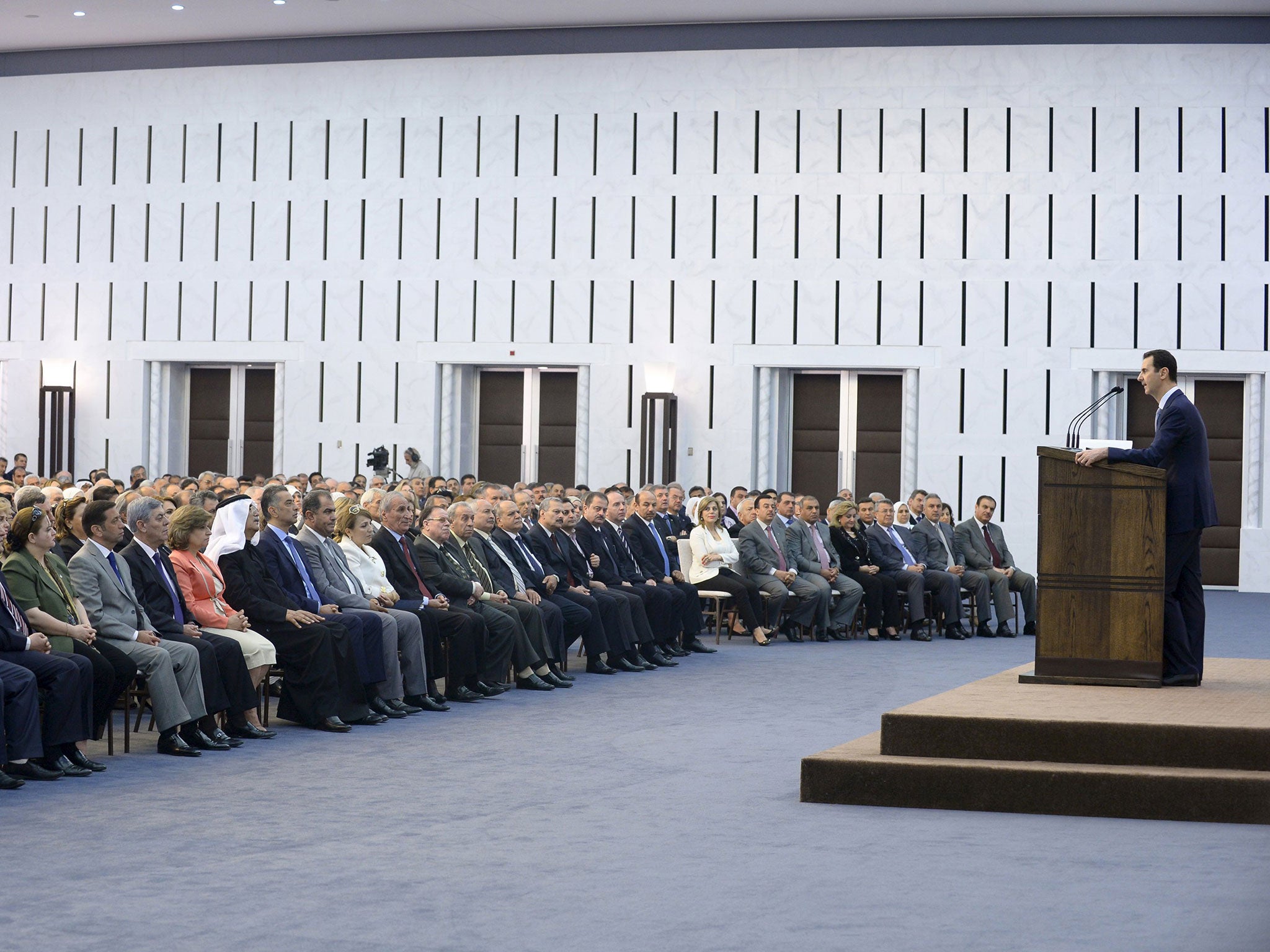War with Isis: President Bashar al-Assad admits he has given up on parts of Syria
'We must define the important regions that the armed forces hold on to so it doesn’t allow the collapse of the rest of the areas,' Assad says

Your support helps us to tell the story
From reproductive rights to climate change to Big Tech, The Independent is on the ground when the story is developing. Whether it's investigating the financials of Elon Musk's pro-Trump PAC or producing our latest documentary, 'The A Word', which shines a light on the American women fighting for reproductive rights, we know how important it is to parse out the facts from the messaging.
At such a critical moment in US history, we need reporters on the ground. Your donation allows us to keep sending journalists to speak to both sides of the story.
The Independent is trusted by Americans across the entire political spectrum. And unlike many other quality news outlets, we choose not to lock Americans out of our reporting and analysis with paywalls. We believe quality journalism should be available to everyone, paid for by those who can afford it.
Your support makes all the difference.Bashar al-Assad has admitted to the Syrian people that he could no longer control the whole of the country, but denied his army was collapsing in the face of groups such as Isis and Jabhat al-Nusra.
In a speech broadcast on state television, the Syrian President said his forces would win the four-year-old civil war, but acknowledged that he lacked the manpower and had given up attempting to control large parts of Syria in order, he said, to safeguard regime strongholds.
“We are not collapsing. We are steadfast and will achieve victory,” Mr Assad said in an address to local officials in Damascus. “Defeat does not exist in the dictionary of the Syrian Arab army.”
However, “sometimes, in some circumstances, we are forced to give up areas to move those forces to the areas that we want to hold on to,” he admitted.
His speech followed a series of major military setbacks, the largest being the fall of the city of Idlib to an al-Nusra-dominated alliance in March. It is only the second provincial capital to fall out of regime hands since the beginning of the war. The first was Raqqa, which is now the de facto capital of the so-called Islamic State.
Reports from Idlib said Syrian troops fled in the face of overwhelming forces, and attempts to reinforce them failed when new recruits and loyalist militia from Aleppo refused to fight.
“Every inch of Syria is precious,” Mr Assad said, but added: “We must define the important regions that the armed forces hold on to so it doesn’t allow the collapse of the rest of the areas. The army is capable… Everything is available, but there is a shortfall in human capacity.”
Mr Assad’s speech follows a government announcement on Saturday of a general amnesty for deserters and draft dodgers in an effort to boost numbers in his conscription army. Many thousands of young men have fled Syria rather than fight for the Assad regime, and thousands more are fighting against him.
The Syrian army has lost huge areas of the country since the outbreak of civil war in 2011, and the country is now split between four different powers: Isis controls much of Raqqa, parts of central Syria including Palmyra, and large areas of the border areas with Iraq; Kurds near the Turkish and Iraqi borders have declared an autonomous area known as Rojava; and Idlib has become the de facto base of the Nusra-dominated Jaish al-Fath (Army of Conquest) alliance.
After the fall of Idlib, Mr Assad told the Swedish paper Expressen: “Sometimes you win, sometimes you lose”.
The regime’s strongholds in Damascus and Latakia, on the coast, are under threat of attack or are besieged. Territory to the south near Lebanon has switched hands between the army, backed by fighters from the Lebanese group Hezbollah, and rebels groups including Jabhat al-Nusra, Isis and the remnants of the Free Syrian Army.
Mr Assad said that his government did not want war “but when it was imposed on us, the Syrian Arab army repelled the terrorists everywhere” – a reference to all the rebels fighting against him.
He was also steadfast in his refusal to agree on a political solution to the civil war. Any initiative not based on fighting “terrorism” would be “hollow” and “meaningless”.
Join our commenting forum
Join thought-provoking conversations, follow other Independent readers and see their replies
Comments